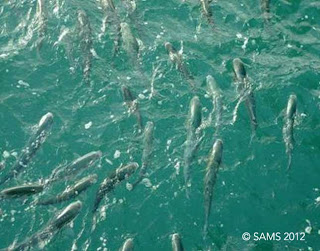Firstly, for those that think the process as untransparent, there have been major advances in direct communication. If you want to see the press conference (at about 04:30) this morning, I recommend the following link (you can download Silverline from the same site; it takes 30 seconds):
http://video.consilium.europa.eu/webcast.aspx?ticket=775-979-11413
What you will see are the bones of the agreement; the hugely significant Danish chair (she is an amazing character – such energy, humour and focus) and the very measured response of Commissioner Damanaki. I will talk about the significance of the word ‘measured’ later.
Earlier in the negotiations, each delegation presented its view on the Commission proposal. These are all available on the video hyperlink at the end of this paragraph. I should explain that the country statements are in national languages (what a translation task!) so it is impossible to get a clear picture by listening to this unless you are the ultimate polyglot. If you click on the link, you will see little flags that take you directly to your own country’s position. The statement by Richard Benyon, UK Fisheries Minister is well worth listening to. This is an unequivocal call for reform including the banning of discards within a reasonable timeframe, the use of scientific information to fish within ecosystem limits, the regionalisation of fisheries policy and the strict control on funds that can be used to subsidise overfishing. Brilliant. I listened to the French and Spanish positions as well; both agreed on discard bans (with lots of caveats), avoided the issue of regionalisation, agreed to MSY (maximum sustainable yield) with caveats but, most importantly, focussed on exceptions for vessels under 15 metres. France even proposed extending inshore fisheries to 100 miles at one point. It is the exceptions that are particularly troubling because ‘inshore’ has plenty of interpretations (most of France’s fleet is ‘inshore’ for example) and the new Marine Strategy Framework Directive sets a MSY target for all fisheries and many countries want that changed or reinterpreted. The web link:
http://video.consilium.europa.eu/webcast.aspx?ticket=775-979-11427
So the Council agreed on a phased discard ban, MSY for offshore fisheries by around 2015 (though not fully implemented until 2020, but the dates still need clarification), an undefined move towards regionalisation and reforms in funding through a new Maritime and Fisheries Fund (potentially a major advance as it could lead to cross fertilisation of the maritime economy) as well as moves towards transferrable quotas. This looks like considerable progress; so why is Mrs Damanaki so cautious in her response?
The answer will be in the details. The agreement falls some way short of the Commission’s proposal and there are a lot of weasel words in the statement communicated by the ebullient Chair; after all, it is a compromise. There will be a huge amount of negotiation in the coming months; pull and push between the sector and environmentalists and between member states with hugely different interests and positions. The next step will be the European Parliament, now empowered to scrutinise Fisheries Council agreements. The Parliament is the new gatekeeper and this restores some of the democracy lost in the past. So watch this space. The agreement is a step in the right direction; it sets a frame for negotiation. The saying goes that ‘there are many fish in the sea’ but this applies to the stakeholders and Member States and not, unfortunately to our diminished shared stocks.

Great summary of the past 24 hours - nice to see some intepretation of events!
ReplyDeleteThe apparent rebuilding of some stocks is of course good news but means more juvenile and young fish on the grounds, increasing the urgency of addressing the discards issue. Some improvements are possible using more selective fishing gears but these approaches can never eliminate catching of undersized and non-target species completely. For the mixed fisheries a rigorous system of tracking complete catch is needed. There has been some progress with use of video-systems which observe the catch as it comes through the processing section of larger vessels but it is hard to see how these technologically expensive systems can be used on smaller vessels. As Laurence says, the devil will be in the detail and putting into operation a true discards-ban will be challenging. This probably explains the timeframes involved, pelagics first (which are generally cleaner fisheries) and the mixed fisheries later on. The danger is that this timeframe will slip and the staged introduction of the ban be used as an excuse to do too little, at a time when improvements in some stocks make this an urgent issue.
ReplyDelete